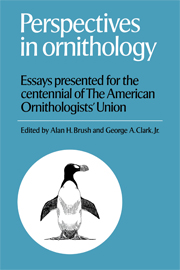 Perspectives in Ornithology
Perspectives in Ornithology Book contents
- Frontmatter
- Contents
- List of contributors
- Preface
- Introduction
- 1 Captive birds and conservation
- 2 Research collections in ornithology – a reaffirmation
- 3 On the study of avian mating systems
- 4 Cooperative breeding strategies among birds
- 5 Ecological energetics: what are the questions?
- 6 Perspectives in optimal foraging
- 7 Biochemical studies of microevolutionary processes
- 8 Organization of the avian genome
- 9 The origin and early radiation of birds
- 10 Avian community ecology: an iconoclastic view
- 11 Biogeography: the unification and maturation of a science
- 12 Bird song learning: theme and variations
- 13 Bird navigation
- Index
3 - On the study of avian mating systems
Published online by Cambridge University Press: 04 August 2010
- Frontmatter
- Contents
- List of contributors
- Preface
- Introduction
- 1 Captive birds and conservation
- 2 Research collections in ornithology – a reaffirmation
- 3 On the study of avian mating systems
- 4 Cooperative breeding strategies among birds
- 5 Ecological energetics: what are the questions?
- 6 Perspectives in optimal foraging
- 7 Biochemical studies of microevolutionary processes
- 8 Organization of the avian genome
- 9 The origin and early radiation of birds
- 10 Avian community ecology: an iconoclastic view
- 11 Biogeography: the unification and maturation of a science
- 12 Bird song learning: theme and variations
- 13 Bird navigation
- Index
Summary
At the founding of the American Ornithologists' Union, a list of scientific priorities would not have included the study of bird mating systems. However, natural history anecdotes on avian breeding habits were accumulating as incidental by-products of more pressing field activities. For example, in the first issue of the new journal, The Auk, J. W. Banks (1884) documented male parental investment in the Broadwinged Hawk, Buteo “pennsylvanicus”(= platypterus) as follows: “The male parent was sitting on the nest at the time I approached it, and when I began to climb the tree, he flew to a bough some seventy yards off, where he was shot. His stomach contained the partially digested remains of three unfledged thrushes.”
In the century since, numerous developments have shifted ornithological priorities away from basic collecting and toward increasingly theoretical issues. The maturing of Darwinism and its marriage to Mendelian genetics produced “neo-Darwinism,” which begot a family of new disciplines, such as ethology, population biology, and sociobiology (Wilson 1975; Lloyd 1979). The male Broad-winged, immortalized above (and presumably as a specimen), might now be remembered primarily for his paternal contributions of nest guarding, brooding, and thrush hunting.
On a modern theoretical level, sexual reproduction itself is seen as a paradoxically inefficient means of replicating genes; yet it is a system that a great many organisms use (or are stuck with; Williams 1975).
- Type
- Chapter
- Information
- Perspectives in OrnithologyEssays Presented for the Centennial of the American Ornitholgists' Union, pp. 55 - 92Publisher: Cambridge University PressPrint publication year: 1983
- 20
- Cited by


